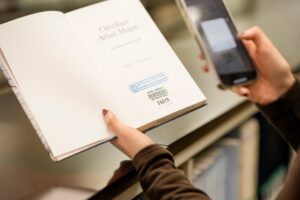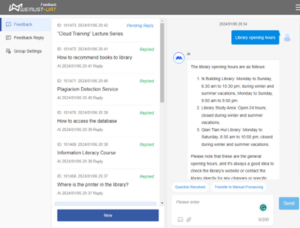Innovation for Enhanced Smart Library Services
27 أبريل 2024

The Macau University of Science and Technology (M.U.S.T.) is a young and vibrant university that embraces technology and innovation across its spectrum of educational endeavors. The university has developed and deployed a smart campus service platform called WeMust. Designed as a microservice architecture, the WeMust platform encompasses over one hundred applications aimed at enriching the campus experience. The M.U.S.T. Library plays a vital role in the WeMust initiative by integrating and streamlining various library services into the platform, serving users from different academic and administrative departments. Some key applications include Scan to Borrow for print book loans, thesis management, and using AI to enhance customer service.
Scan to Borrow
The M.U.S.T. Library introduced its signature application Scan to Borrow in 2021. Patrons can use this application on their mobile devices to borrow print books by scanning the book’s barcode. This eliminates the need to wait in line at the self-check-out kiosks or the Circulation Service Counter. Since its launch, the service has been widely used by patrons, with approximately seventy percent of the print book loans now being borrowed through the Scan to Borrow application. This reflects a shift in patrons’ preferences towards digital convenience and validates the importance of the application as a notable enhancement to the library’s services.
The application also includes features such as renewal and overdue fee reminders, further enhancing loan management for patrons. Currently, the library is developing an innovative Scan to Transfer feature to complement the existing Scan to Borrow application. Scan to Transfer will enable patrons to pass on books they have finished reading to another patron interested in borrowing them, circumventing the need for both individuals to physically visit the library for returning and borrowing. This community-centric model fosters a culture of book-sharing between individuals, and has already been adopted by several libraries.

Advancing Collaboration and Efficiency in Thesis Management
WeMust offers a series of integrated applications designed to streamline the cycle of thesis management. Functions include supervisor assignment, research proposal evaluation, plagiarism check, thesis defence, and thesis submission. By offering a cohesive and user-friendly platform, it optimises workflows for students, academic advisors, evaluators, librarians, and administrators engaged in the thesis management process. This all-encompassing solution not only improves efficiency, but also enhances the overall academic experience by providing a centralised hub for all thesis-related activities.
This project markedly reduces the reliance on paper and printing, leading to significant environmental benefits and resource savings. It also saves time for students, advisors, and administrators by streamlining academic tasks. By embracing a paperless solution, the project is aligned with two UN Sustainable Development Goals (SGDs): SDG 12 (Responsible Consumption and Production) and SDG 13 (Climate Action). This demonstrates the university’s commitment to sustainable development and social responsibility.
Adopting AI to Enhance Library Customer Service
In November 2023, the library successfully upgraded the AI chatbot on the WeMust platform with support from the University Information Technology Development Office. The library had previously experimented with AI-based feedback functions, but it was only able to respond to a very limited set of simple and direct questions, and could not engage in a conversation. The launch of the AI chatbot exceeded our expectations, proving to be efficient and reliable for patrons, saving time and reducing workload surrounding email exchanges, telephone calls, and face-to-face communications.
The chatbot is trained on standardised data from hundreds of FAQs collected by all units of the library. It can answer questions using the information fed into its database. If a question is not found in the database, the chatbot can redirect the query to a relevant unit or librarian for human assistance. When a colleague answers a new question manually, the answer will be added to the chatbot’s database for future use and reference. This allows the chatbot to continually grow its database and improve its ability to provide answers to users .

The M.U.S.T. Library is convinced that technology, when applied judiciously, serves greatly for education, research, and humanity. Hence, we remain committed to integrating cutting-edge innovations and technological advances while upholding our unwavering dedication to service excellence and librarian expertise. We will keep up our efforts on sustainably facilitating academic research, improving patrons’ user experience, and serving as a key hub for academic exchange and knowledge sharing within the university.
Contributed by Xiaobing Zhang and Kunyang Liu, Reference Librarians, Macau University of Science and Technology